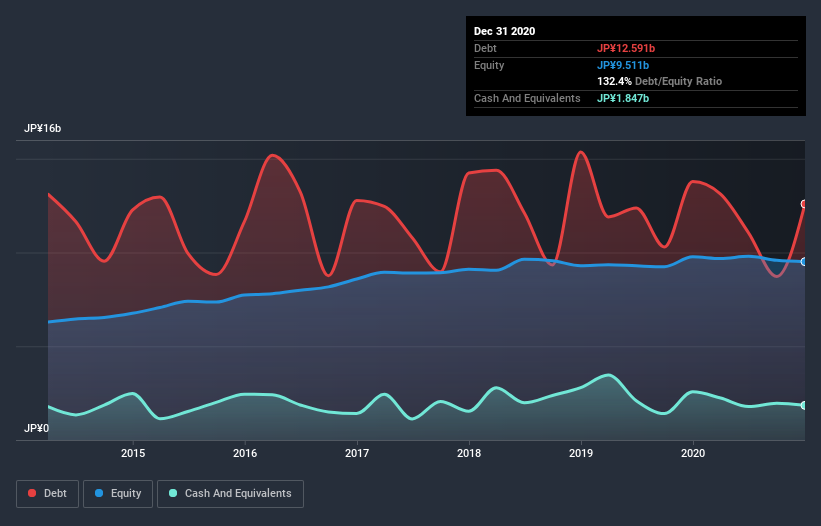
Howard Marks put it nicely when he said that, rather than worrying about share price volatility, 'The possibility of permanent loss is the risk I worry about... and every practical investor I know worries about.' So it might be obvious that you need to consider debt, when you think about how risky any given stock is, because too much debt can sink a company. We can see that Kitoku Shinryo Co., Ltd. (TYO:2700) does use debt in its business. But is this debt a concern to shareholders?
When Is Debt Dangerous?
Generally speaking, debt only becomes a real problem when a company can't easily pay it off, either by raising capital or with its own cash flow. If things get really bad, the lenders can take control of the business. However, a more usual (but still expensive) situation is where a company must dilute shareholders at a cheap share price simply to get debt under control. Of course, plenty of companies use debt to fund growth, without any negative consequences. The first thing to do when considering how much debt a business uses is to look at its cash and debt together.
See our latest analysis for Kitoku Shinryo
What Is Kitoku Shinryo's Net Debt?
The image below, which you can click on for greater detail, shows that Kitoku Shinryo had debt of JP¥12.6b at the end of December 2020, a reduction from JP¥13.8b over a year. However, because it has a cash reserve of JP¥1.85b, its net debt is less, at about JP¥10.7b.

How Healthy Is Kitoku Shinryo's Balance Sheet?
The latest balance sheet data shows that Kitoku Shinryo had liabilities of JP¥17.0b due within a year, and liabilities of JP¥3.33b falling due after that. Offsetting these obligations, it had cash of JP¥1.85b as well as receivables valued at JP¥8.75b due within 12 months. So its liabilities outweigh the sum of its cash and (near-term) receivables by JP¥9.68b.
The deficiency here weighs heavily on the JP¥5.51b company itself, as if a child were struggling under the weight of an enormous back-pack full of books, his sports gear, and a trumpet. So we definitely think shareholders need to watch this one closely. After all, Kitoku Shinryo would likely require a major re-capitalisation if it had to pay its creditors today. There's no doubt that we learn most about debt from the balance sheet. But you can't view debt in total isolation; since Kitoku Shinryo will need earnings to service that debt. So if you're keen to discover more about its earnings, it might be worth checking out this graph of its long term earnings trend.
In the last year Kitoku Shinryo had a loss before interest and tax, and actually shrunk its revenue by 8.5%, to JP¥108b. We would much prefer see growth.
Caveat Emptor
Over the last twelve months Kitoku Shinryo produced an earnings before interest and tax (EBIT) loss. Indeed, it lost JP¥42m at the EBIT level. When we look at that alongside the significant liabilities, we're not particularly confident about the company. It would need to improve its operations quickly for us to be interested in it. On the bright side, we note that trailing twelve month EBIT is worse than the free cash flow of JP¥386m and the profit of JP¥62m. So there is definitely a chance that it can improve things in the next few years. There's no doubt that we learn most about debt from the balance sheet. But ultimately, every company can contain risks that exist outside of the balance sheet. Case in point: We've spotted 6 warning signs for Kitoku Shinryo you should be aware of, and 2 of them are significant.
At the end of the day, it's often better to focus on companies that are free from net debt. You can access our special list of such companies (all with a track record of profit growth). It's free.
If you’re looking to trade Kitoku Shinryo, open an account with the lowest-cost* platform trusted by professionals, Interactive Brokers. Their clients from over 200 countries and territories trade stocks, options, futures, forex, bonds and funds worldwide from a single integrated account. Promoted
If you're looking to trade Kitoku Shinryo, open an account with the lowest-cost platform trusted by professionals, Interactive Brokers.
With clients in over 200 countries and territories, and access to 160 markets, IBKR lets you trade stocks, options, futures, forex, bonds and funds from a single integrated account.
Enjoy no hidden fees, no account minimums, and FX conversion rates as low as 0.03%, far better than what most brokers offer.
Sponsored ContentValuation is complex, but we're here to simplify it.
Discover if Kitoku Shinryo might be undervalued or overvalued with our detailed analysis, featuring fair value estimates, potential risks, dividends, insider trades, and its financial condition.
Access Free AnalysisThis article by Simply Wall St is general in nature. It does not constitute a recommendation to buy or sell any stock, and does not take account of your objectives, or your financial situation. We aim to bring you long-term focused analysis driven by fundamental data. Note that our analysis may not factor in the latest price-sensitive company announcements or qualitative material. Simply Wall St has no position in any stocks mentioned.
*Interactive Brokers Rated Lowest Cost Broker by StockBrokers.com Annual Online Review 2020
Have feedback on this article? Concerned about the content? Get in touch with us directly. Alternatively, email editorial-team (at) simplywallst.com.
About TSE:2700
Kitoku Shinryo
Engages in the procurement, processing, sale, and import/export of rice and rice products, animal feed, hen’s eggs in Japan and internationally.
Proven track record with adequate balance sheet.
Market Insights
Community Narratives



